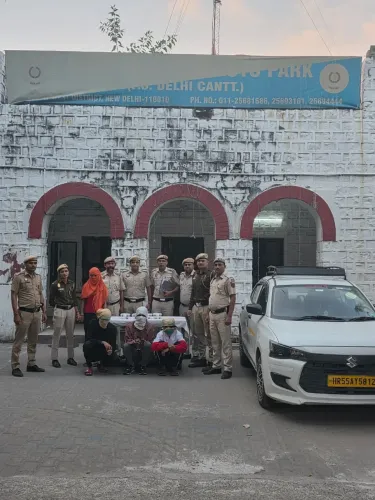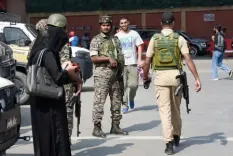Did BJP Block Ali Khan Mahmudabad’s Family Inheritance Tied to Jinnah?

Synopsis
Key Takeaways
- Akhilesh Mishra highlights the impact of 2017 legislation on Ali Khan Mahmudabad's family inheritance.
- The Enemy Property Act plays a crucial role in this contentious issue.
- Mahmudabad's recent arrest underscores the intersection of politics and social media discourse.
- Criticism arises regarding the timing and implications of Mahmudabad's statements.
- This situation raises broader questions about national integrity and historical narratives.
New Delhi, May 19 (NationPress) The CEO of BlueKraft Digital Foundation, Akhilesh Mishra, has sparked renewed discussions regarding the contentious history of the Mahmudabad estate. He pointed out that the BJP government’s actions in 2017 effectively halted the transfer of significant ancestral assets to the family of Ali Khan Mahmudabad, an Ashoka University professor recently detained over a provocative social media remark.
Mishra referred to earlier legal battles concerning the Enemy Property Act, quoting the late Arun Jaitley’s insights: “The Enemy Property Act of 1968 stripped the Raja of Mahmudabad of all his properties in India. The SC incorrectly decided that Mahmudabad’s son could inherit his property, despite Mahmudabad being a citizen of Pakistan while sending his son to live in India.”
He mentioned that it was former Finance Minister P. Chidambaram who tried to reverse the Supreme Court’s decision through an ordinance, but alleges that “UPA's vote bank politics triumphed, leading to the ordinance’s expiration.”
The issue was settled when the BJP government enacted legislation in 2017 that barred the Mahmudabad family from claiming their ancestral properties. “The bottom line: Due to the BJP Government’s actions, the Mahmudabad family has been denied the right to inherit substantial property that the Raja used to finance Jinnah and the concept of Pakistan,” Mishra stated.
This pointed critique follows the arrest of Ali Khan Mahmudabad on Sunday, after two FIRs were lodged against him for severe allegations, including jeopardizing India’s sovereignty and integrity, linked to social media posts about Operation Sindoor—a recent military operation amid rising tensions with Pakistan.
Mishra did not shy away from his criticism, accusing Mahmudabad of engaging in “deceptive propaganda” that echoed “talking points from Pakistan.”
He deemed the timing of the post particularly suspicious: “It was a treacherous attempt to create a Hindu-Muslim divide just after Operation Sindoor and while Pakistan was still deploying drones into India. Whose agenda was he serving, if not Pakistan's?”
Mishra emphasized parts of Mahmudabad’s Facebook post, asserting that the professor’s rhetoric resembled that of Pakistani military leaders.
“Examine the last section of his post. It suggests that the logic of Pakistan (as articulated by Pakistani Army Chief Asim Munir) may have been momentarily countered by the GOI’s optics, but the reality on the ground is largely unchanged (Munir's argument),” he noted.
He also criticized Mahmudabad for referencing the lynching of Muslims in India, accusing him of distorting isolated incidents as if they were state policy.
“An isolated local law and order issue from a decade ago is casually presented as a lived reality that influences our near-war stance with Pakistan?” Mishra contended, highlighting that if communal violence is relevant in this context, recent events like the violence against Hindus in Murshidabad should also be recognized.
“Did anyone witness the Indian government or any so-called 'right-wing' that Ali Khan disparages in his post mention Murshidabad in the context of a near-war with Pakistan? No, right? Why? Because in a near-war scenario, only treacherous individuals attempt to widen domestic divides or echo sentiments that directly aid the adversary.
“Ali Khan Mahmudabad’s Facebook post is merely a reiteration of Pakistan’s narrative. He articulated it in better English, framing it so he could later deny being an 'Enemy of the State' (FOE),” he concluded.









